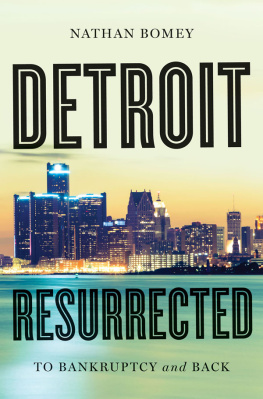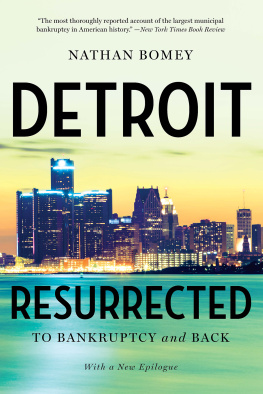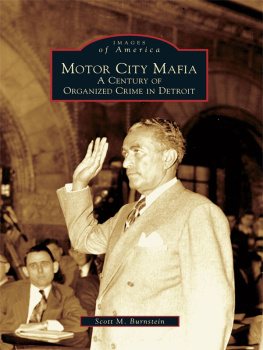

To Kathryn
CONTENTS
July 18, 2013, was a bad day for Bill Wertheimers 2005 Saturn Vue to overheat. The crossover vehicle lumbered westward on Interstate 96 in mid-Michigan, its overworked engine straining to make the ninety-mile trek from the Motor City to the state capital of Lansing.
As Wertheimer eased off the accelerator, United Auto Workers general counsel Mike Nicholson typed furiously on a laptop in the back seat, putting the finishing touches on a legal brief supporting an emergency effort to block the City of Detroit from filing the largest municipal bankruptcy in U.S. history.
The two labor attorneyslongtime friends who had marched in picket lines together and spent their careers fighting for union rightswere determined to undermine any attempt by the city to use a bankruptcy to cut benefits for retirees and active workers.
With two hundred thousand miles on the odometer, Wertheimers Vue sputtered along the pavement, the urgency of the moment unrecognized.
We pay you enoughget a new fucking car! Nicholson screamed.
Even for a city whose descent was half a century in the making, minutes still mattered.
Detroit emergency manager Kevyn Orrwho had been installed four months earlier by Michigan governor Rick Snyder as the all-powerful de facto CEO of the citys governmentwas poised to thrust Detroit into Chapter 9 bankruptcy.
Orr, a Democrat, reported to the technocratic Republican governor. Not the City Council. Not the mayor. Elected officials had been rendered powerless under a controversial state law that allowed the governor to seize control of cities in fiscal chaos. The emergency manager had the authority to sever union contracts, dramatically overhaul city government, dispense of city assets, and control the budgeting process.
The son and grandson of African Methodist Episcopal ministers, Orr, a bankruptcy attorney before becoming emergency manager, spent the first several months of his appointment preaching the same sermon over and over: Detroits financial position is not sustainable, the government is broken, and the citys neglected residents deserve better.
By now the strategy was set. Earlier in the week, Orr had requested the governors permission to file for bankruptcy and mapped out a plan to file the official documents with the court at 10:00 a.m. on Friday, July 19. Bill Nowling, Orrs mustachioed senior advisor and spokesman, had even sketched a blueprint for a media blitz involving Orr and the governor immediately after the filing. They would barnstorm Michigan news media and the national press in an effort to define the bankruptcy filing as a fresh start for the city, rather than a dead end.
Attorneys for Jones Day, the citys lead restructuring law firm, teed up the appropriate legal documents.
Not uncommonly, when youre preparing for a bankruptcy you circle a target date for a filing, and we did that here, said Jones Day lawyer David Heiman, the citys lead attorney in the case. In Chapter 11, we call it a soft landing, so that you continue the operation of a corporation on the day you file as though there was no filing and everything continues to operate smoothly. Thats what you strive for.
Wertheimer, Nicholson, and attorneys for the citys two pension plans were hell-bent on injecting chaos into the equation by outmaneuvering the citys legion of restructuring lawyers, consultants, and bankers before the case could begin. They seized the chance to blast a hole in Orrs orderly plans around midday Thursday, July 18, when the Detroit Free Press reported on its website that a Chapter 9 bankruptcy filing could come at any time. They figured, correctly, that they had a limited window for a surprise attack. Fearing the prospect of unprecedented pension cutswhich Orr had already threatened to help balance Detroits booksthe attorneys immediately devised plans to seek a temporary restraining order, or TRO, preventing the city from filing for bankruptcy.
Nicholson and Wertheimer jumped into the ramshackle Saturn Vue and set out from the UAWs Solidarity House headquarters in Detroitthe same complex where, four years earlier, labor leaders had navigated the historic bankruptcies of General Motors and Chrysleron a course to the Ingham County Circuit Court in Lansing.
When Nowling discovered that the Free Press was set to post a story, he alerted Orr. They headed to Cadillac Place, a palatial state government complex in Detroit that at one time had served as the headquarters of GM, to revise their game plan. They feared that after the Free Press story hit the Internet, it would prompt creditors to pursue a TRO to block the case.
We were very nervous about it, Heiman said. And for good reason. Thats exactly what the citys opponents had set out to do.
With no knowledge of the efforts to block the filing, Orr and Nowling called Snyder and urged him to sign a letter immediately authorizing the filing on the assumption that creditors would act after reading about the citys plans for Friday. But the governor resisted accelerating his timeline, embracing a methodical approach to the historic process despite a natural proclivity for expediency. Im committed to my process, and this is what were going to do, Snyder, who had already been reviewing Orrs request for about two days, said on the call.
Nicholson, who once directed the UAWs efforts to protect workers in auto-supplier bankruptcies, knew that a bankruptcy could devastate vulnerable Detroit retirees and union members. Although the unions direct involvement in Detroit city labor negotiations was minimal, UAW president Bob King had taken a special interest in the citys plight and personally directed Nicholson to help fight pension cuts.
On their way to the courthouse, Wertheimer and Nicholson bounced ideas off each other, tweaking their emergency request and strategizing for their appearance before Ingham County Circuit Court judge Rosemarie Aquilina.
An ethical quandary quickly presented itself. They had no legal obligation to alert the City of Detroit or the governors Republican allies in the Michigan attorney generals office to their sneak attack.
Mike, do you think we should notify the state? Wertheimer said.
Reluctant to relinquish the element of surprise, Nicholson nonetheless believed they had an ethical responsibility to say something.
Yeah, Bill, he told his friend. Its not in our interest, but I think we have to do that. Thats the right thing to do.
They figured that as soon as they placed the call, Orrs team of bankruptcy lawyers would devise a counterattack.
We knew damn well what would happen, Wertheimer said. But we didnt feel like we could be in front of Aquilina without giving them notice. We didnt think we could do that ethically.
The pair waited until about 3:35 p.m. before placing a call to alert the attorney generals office that Aquilina would hold a hearing at 4:00 p.m.
Back in Detroit, Orr was initially unaware of the emergency hearing. He had spent the last several days fending off a steady barrage of lawsuits challenging his appointment, the potential bankruptcy, and the citys decision to stop paying its unsecured debts.
Orr had concluded that rehabilitating Detroit without bankruptcy was impossible. He needed a U.S. Bankruptcy Courts protection from the onslaught of lawsuits and creditors. Orrs team had grown impatient at his efforts to entice retirees and financial creditors to reach settlements in lieu of bankruptcy.
Their view was: Its nice youre trying to do this Kumbaya thing and get everybody to work together. But it aint workin, they aint listening, and youre starting to lose momentum and the initiative, Orr said.
Next page













